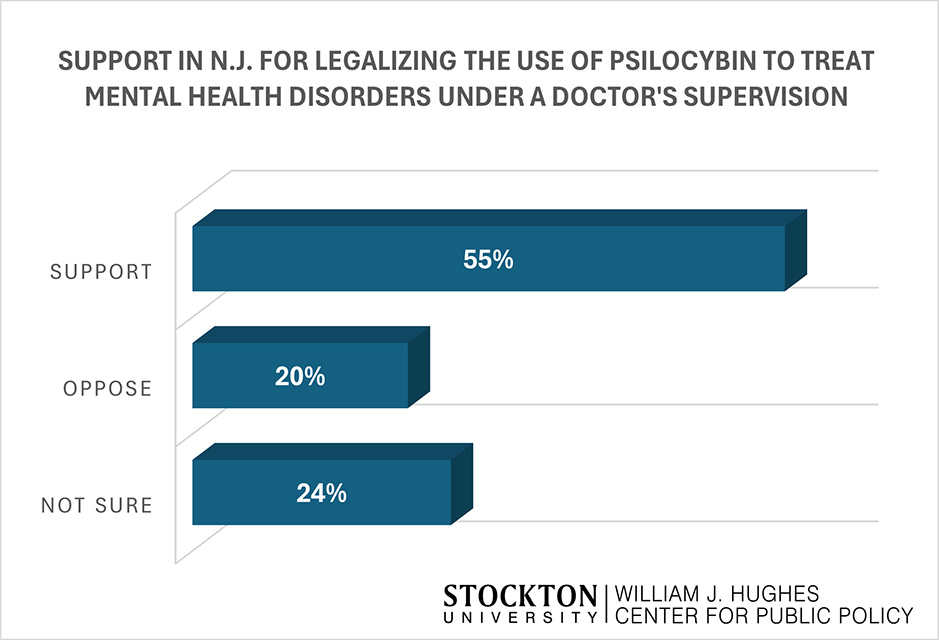Research Evaluates Effectiveness, Support for Medicinal Mushrooms

Research conducted by Stockton Professor of Psychology and Hughes Center Faculty Associate Justin Ostrofsky and his team of student researchers, Shayla Nagle, Morgan Seidman and Katherine Wilkinson has found that the use of psilocybin under professional supervision, or psilocybin-assisted therapy, has shown significant anti-depressant and anti-anxiety effects that have been replicated across multiple randomized clinical trials.
Galloway, N.J. —Psilocybin has been shown to effectively reduce depression and anxiety and a slim majority of New Jersey residents approve legalizing this type of treatment, according to research released today by the William J. Hughes Center for Public Policy at Stockton University.Psilocybin is the psychoactive compound in magic mushrooms.
The research was conducted by Stockton Professor of Psychology and Hughes Center Faculty Associate Justin Ostrofsky and his team of student researchers, Shayla Nagle, Morgan Seidman and Katherine Wilkinson.
The Hughes Center aims to be at the forefront of new, and perhaps lesser-known, policy discussions. We hope this report adds to the public discourse around this topic and helps New Jersey residents feel more informed.”Hughes Center Interim Director Alyssa Maurice
“The Hughes Center aims to be at the forefront of new, and perhaps lesser-known, policy discussions,” said Hughes Center Interim Director Alyssa Maurice. “We hope this report adds to the public discourse around this topic and helps New Jersey residents feel more informed.”
Some highlights from the research report include:
- The use of psilocybin under professional supervision, or psilocybin-assisted therapy, has shown significant anti-depressant and anti-anxiety effects that have been replicated across multiple randomized clinical trials.
- The effects of this treatment are comparable to the effects of more traditional pharmaceutical drugs used to treat depression, like selective serotonin reuptake inhibitor (SSRI) medications.
- Clinical trials have shown that only 1-2 doses of psilocybin are sufficient to produce anti-depressant effects lasting months, are generally not associated with long-lasting side-effects, and have immediate effect.
- The professionally supervised use of psilocybin in a well-controlled environment seems to pose minimal risks for physical and psychological harm.
- Clinical researchers have established safety guidelines to govern the use of psilocybin-assisted therapy, which includes a set of criteria that should be used to determine who is a good candidate for this type of treatment, standards for the minimum number of supervisors, proper training and more.

Key findings from the statewide poll featured in the report include:
- Most New Jersey residents (57%) were at least somewhat aware of the medicinal use of psychedelics to treat mental health disorders.
- A little more than half of New Jerseyans (55%) support legalizing such treatment under a doctor’s supervision, while 20% oppose and 24% are unsure.
- People who were more aware of this type of treatment, have used psychedelics in the past or know someone who has, or have felt the need to seek treatment for their own mental health issues were more likely to support legalizing psilocybin-assisted therapy.
- Levels of support for legalization varied by demographics like age and partisan affiliation, with younger cohorts aged 18-49 and Democrats demonstrating higher rates of support.
- In terms of general sentiment, a plurality of New Jersey residents (47%) is neutral or hold no opinion of psychedelic drugs, about 1 in 5 (19%) view them positively and nearly one-third (32%) have a negative view.
The research was spurred by a bill recently introduced in the New Jersey state senate which, if passed, would “authorize the production and use of psilocybin (for residents who are 21 or older) to promote health and wellness” and allow for the establishment of psilocybin service centers.
The bill would also decriminalize psilocybin and expunge past related offenses. However, the Hughes Center report only evaluates the medicinal use of psilocybin in a controlled setting and does not address recreational or unsupervised use.
In an audio conversation about the report, the researchers called for increased awareness and education around alternative forms of behavioral healthcare.
“Depression and anxiety are two mental health disorders many people suffer from but not all individuals respond well to traditional forms of treatment,” said Ostrofsky, who led the study.
Researchers Nagle and Seidman graduated from Stockton with their bachelor’s in Psychology in May and Wilkinson is a senior at Stockton also majoring in Psychology.
You can listen to an audio conversation with the researchers discussing their findings here.
Find the full research report here.
Find the full poll results here.
Methodology
The poll of New Jersey adult residents was conducted by the Stockton Polling Institute of the William J. Hughes Center for Public Policy from Feb. 20-March 3, 2024. Stockton University students texted cell phones with invitations to take the survey online and Opinion Services supplemented the dialing portion of the fieldwork, which consisted of cell and landline telephone calls. Overall, 96% of interviews were conducted on cell phones and 4% on landline phones. In terms of mode, 82% were reached via dialing and 18% were reached via text-to-web. A total of 606 New Jersey adult residents were interviewed. Both cell and landline samples consisted of random digit dialing (RDD) sample from MSG. Data are weighted based on U.S. Census Bureau ACS 2022 data for New Jersey on variables of age, race, education level and sex. The poll's margin of error is +/- 4.0 percentage points at a 95% confidence level. MOE is higher for subsets.
About the Hughes Center
The William J. Hughes Center for Public Policy at Stockton University serves as a catalyst for research, analysis and innovative policy solutions on the economic, social and cultural issues facing New Jersey, and promotes the civic life of New Jersey through engagement, education and research. The center is named for the late William J. Hughes, whose distinguished career includes service in the U.S. House of Representatives, Ambassador to Panama and as a Distinguished Visiting Professor at Stockton. The Hughes Center can be found on YouTube, and can be followed on Facebook @StocktonHughesCenter and X @hughescenter.


